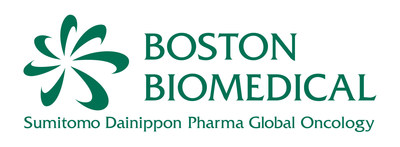Boston Biomedical Initiates CanStem303C: A Global Phase III Study Investigating Cancer Stemness Inhibitor Napabucasin in Patients With Pretreated Advanced Colorectal Cancer
Boston Biomedical Pharma, Inc.
Oct 21, 2016, 08:00 ET
Approximately 1.4 million patients are diagnosed with colorectal cancer each year, making the disease the fourth leading cause of cancer-related deaths annually with nearly 700,000 deaths reported worldwide.i, ii An estimated 50 percent of all colorectal cancer patients will experience disease recurrence.iii
“Early clinical data for napabucasin in combination with FOLFIRI in advanced colorectal cancer has demonstrated encouraging anti-tumor activity even in FOLFIRI-pretreated patients, so we are eager to understand more deeply its potential therapeutic benefits in this difficult-to-treat cancer,” said Chiang J. Li, M.D. FACP, President, CEO and Chief Medical Officer of Boston Biomedical, and the Head of Global Oncology for Sumitomo Dainippon Pharma Group. “This milestone study is evidence of our commitment to uncover the full potential of cancer stemness pathway inhibition, and develop innovative second-line options for the colorectal cancer patient population.”
Patients in this global Phase III study will be randomized in a 1:1 ratio to receive either two daily doses of 240 mg napabucasin – an orally administered investigational agent designed to inhibit cancer stemness pathways by targeting STAT3 – plus biweekly FOLFIRI or biweekly FOLFIRI alone. The study also allows for the addition of bevacizumab per direction by the study investigator.
A total of 1,250 patients will be enrolled in the study. The primary endpoint of the study is overall survival. Secondary endpoints include progression-free survival (PFS), objective response rate (ORR), disease control rate (DCR), safety and quality of life. Overall survival, PFS, ORR and DCR analyses will be conducted in the general study population as well as in biomarker-positive patients.
“Cancer stem cells are known to be resistant to traditional therapies such as chemotherapy and radiation, and represent a more therapeutically challenging subgroup of cancer cells,” said Axel Grothey, M.D., Professor of Oncology, Mayo Clinic in Rochester, MN.“Therefore, the opportunity to investigate the addition of a cancer stemness inhibitor to established chemotherapeutic regimens in colorectal cancer research is attractive to clinicians seeking to improve long-term outcomes for metastatic colorectal cancer patients.”
Further information about the study is available at www.ClinicalTrials.gov (NCT02753127).
About Cancer Stem Cells
Cancer stem cells (CSCs) exhibit stemness – the ability to self-renew and differentiate into heterogeneous cancer cells. This allows the CSCs to act like seeds, causing a patient’s cancer to relapse or spread within their body.iv,v Evidence suggests that these cells possess resistance to conventional chemotherapy and radiation, so while such treatments can successfully shrink tumors, a population of CSCs may still survive.v,vi
Boston Biomedical is leading the biopharmaceutical industry in the development of novel compounds designed to target cancer stemness pathways, with the goal of addressing stemness, an ongoing challenge in cancer treatment.
About Napabucasin
Napabucasin is an orally-administered investigational agent designed to inhibit cancer stemness pathways by targeting STAT3.vii
Napabucasin is currently being investigated in three Phase III studies in advanced stomach (NCT02178956), colorectal (NCT02753127) and lung cancer (NCT02826161). It is also being investigated in earlier phases in multiple solid and hematologic malignancies, including tumors of the liver, pancreas and brain. More information on napabucasin and ongoing clinical trials can be found at www.BostonBiomedical.com.
About Boston Biomedical
Boston Biomedical, Inc. (Founder, President, CEO and CMO: Chiang J. Li, M.D. FACP) was founded in November 2006 and is wholly owned by Sumitomo Dainippon Pharma Co., Ltd. Boston Biomedical’s mission is to develop the next generation of cancer therapeutics by creating drugs designed to target cancer stemness pathways. Boston Biomedical’s innovation in drug discovery has received a number of recognitions and awards in the United States, including the Frost & Sullivan 2010 North American Drug Discovery Technology Innovation of the Year Award, the National Cancer Institute (NCI) cancer stem cell initiative grant award in 2010, and the 2011 Biotech Pioneer Award at the Alexandria Oncology Summit. The company also received the “Company To Watch” award in the 10th Annual Team Massachusetts Economic Impact Awards in 2013. Boston Biomedical is headquartered in Cambridge, Massachusetts, USA.
Additional information about the company and its product pipeline can be found at www.BostonBiomedical.com.
Disclaimer Regarding Forward-Looking Statements
The forward-looking statements in this press release are based on management’s assumptions and beliefs in light of information presently available, and involve both known and unknown risks and uncertainties. Any forward looking statements set forth in this press release speak only as of the date of this press release. We do not undertake to update any of these forward-looking statements to reflect events or circumstances that occur after the date hereof. Information concerning pharmaceuticals (including compounds under development) contained within this material is not intended as advertising or medical advice.
i World Health Organization. Colorectal cancer fact sheet. Accessible at: http://globocan.iarc.fr/Pages/fact_sheets_cancer.aspx.
ii World Health Organization. Cancer. Accessible at: http://www.who.int/mediacentre/factsheets/fs297/en/.
iii Patrick, E., et al. “Early detection of colorectal cancer recurrence in patients undergoing surgery with curative intent: Current status and challenges.” Journal of Cancer. 2014;5(4):262-271.
iv Gupta PB, Chaffer CL, Weinberg RA. Cancer stem cells: mirage or reality? Nat Med. 2009;15(9):1010-1012.
v Ajani JA, Song S, Hochster HS, Steinberg IB. Cancer stem cells: the promise and the potential. Semin Oncol. 2015;42(suppl 1):S3-S17.
vi Jordan CT, Guzman ML, Noble M. Cancer stem cells. N Engl J Med. 2006;355(12):1253-1261.
vii Li Y, Rogoff HA et al. PNAS. 112(6):1839-44, 2015.
For general inquiries:
Boston Biomedical
617-674-6800

